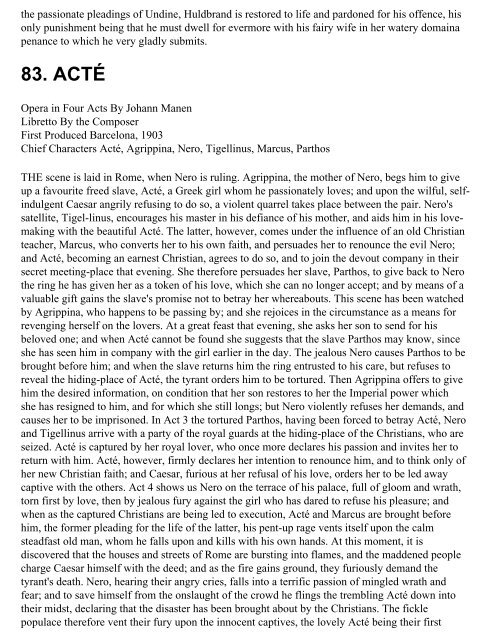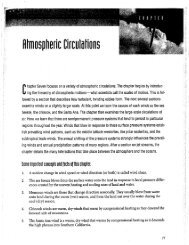Opera Plots I - MDC Faculty Home Pages
Opera Plots I - MDC Faculty Home Pages
Opera Plots I - MDC Faculty Home Pages
Create successful ePaper yourself
Turn your PDF publications into a flip-book with our unique Google optimized e-Paper software.
the passionate pleadings of Undine, Huldbrand is restored to life and pardoned for his offence, his<br />
only punishment being that he must dwell for evermore with his fairy wife in her watery domaina<br />
penance to which he very gladly submits.<br />
83. ACTÉ<br />
<strong>Opera</strong> in Four Acts By Johann Manen<br />
Libretto By the Composer<br />
First Produced Barcelona, 1903<br />
Chief Characters Acté, Agrippina, Nero, Tigellinus, Marcus, Parthos<br />
THE scene is laid in Rome, when Nero is ruling. Agrippina, the mother of Nero, begs him to give<br />
up a favourite freed slave, Acté, a Greek girl whom he passionately loves; and upon the wilful, selfindulgent<br />
Caesar angrily refusing to do so, a violent quarrel takes place between the pair. Nero's<br />
satellite, Tigel-linus, encourages his master in his defiance of his mother, and aids him in his lovemaking<br />
with the beautiful Acté. The latter, however, comes under the influence of an old Christian<br />
teacher, Marcus, who converts her to his own faith, and persuades her to renounce the evil Nero;<br />
and Acté, becoming an earnest Christian, agrees to do so, and to join the devout company in their<br />
secret meeting-place that evening. She therefore persuades her slave, Parthos, to give back to Nero<br />
the ring he has given her as a token of his love, which she can no longer accept; and by means of a<br />
valuable gift gains the slave's promise not to betray her whereabouts. This scene has been watched<br />
by Agrippina, who happens to be passing by; and she rejoices in the circumstance as a means for<br />
revenging herself on the lovers. At a great feast that evening, she asks her son to send for his<br />
beloved one; and when Acté cannot be found she suggests that the slave Parthos may know, since<br />
she has seen him in company with the girl earlier in the day. The jealous Nero causes Parthos to be<br />
brought before him; and when the slave returns him the ring entrusted to his care, but refuses to<br />
reveal the hiding-place of Acté, the tyrant orders him to be tortured. Then Agrippina offers to give<br />
him the desired information, on condition that her son restores to her the Imperial power which<br />
she has resigned to him, and for which she still longs; but Nero violently refuses her demands, and<br />
causes her to be imprisoned. In Act 3 the tortured Parthos, having been forced to betray Acté, Nero<br />
and Tigellinus arrive with a party of the royal guards at the hiding-place of the Christians, who are<br />
seized. Acté is captured by her royal lover, who once more declares his passion and invites her to<br />
return with him. Acté, however, firmly declares her intention to renounce him, and to think only of<br />
her new Christian faith; and Caesar, furious at her refusal of his love, orders her to be led away<br />
captive with the others. Act 4 shows us Nero on the terrace of his palace, full of gloom and wrath,<br />
torn first by love, then by jealous fury against the girl who has dared to refuse his pleasure; and<br />
when as the captured Christians are being led to execution, Acté and Marcus are brought before<br />
him, the former pleading for the life of the latter, his pent-up rage vents itself upon the calm<br />
steadfast old man, whom he falls upon and kills with his own hands. At this moment, it is<br />
discovered that the houses and streets of Rome are bursting into flames, and the maddened people<br />
charge Caesar himself with the deed; and as the fire gains ground, they furiously demand the<br />
tyrant's death. Nero, hearing their angry cries, falls into a terrific passion of mingled wrath and<br />
fear; and to save himself from the onslaught of the crowd he flings the trembling Acté down into<br />
their midst, declaring that the disaster has been brought about by the Christians. The fickle<br />
populace therefore vent their fury upon the innocent captives, the lovely Acté being their first













